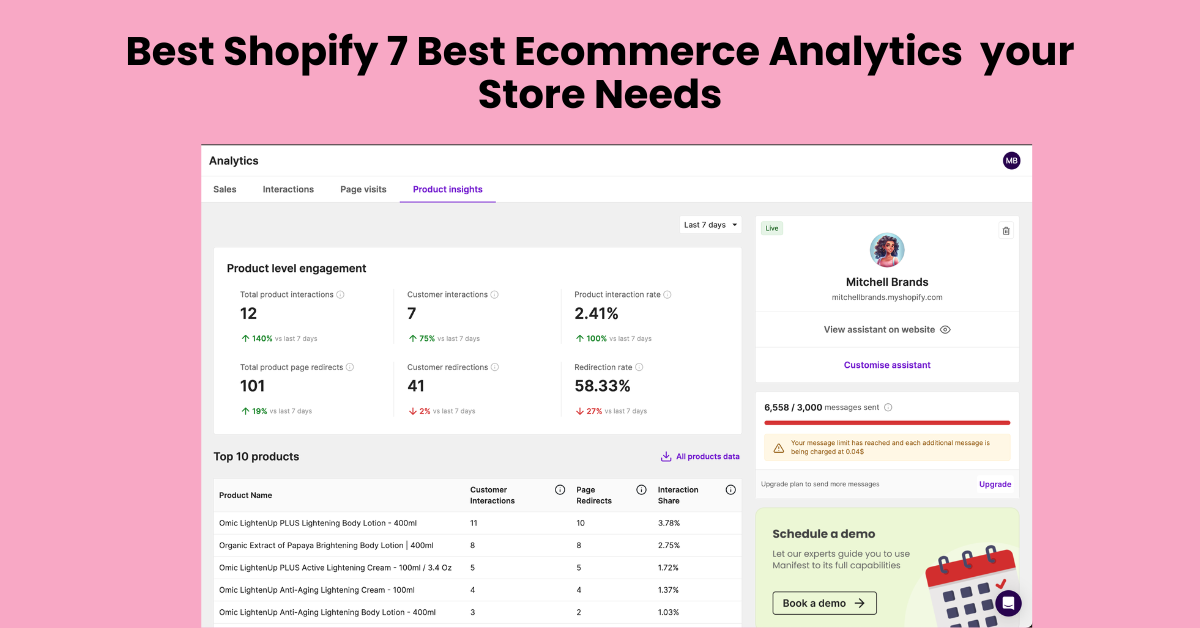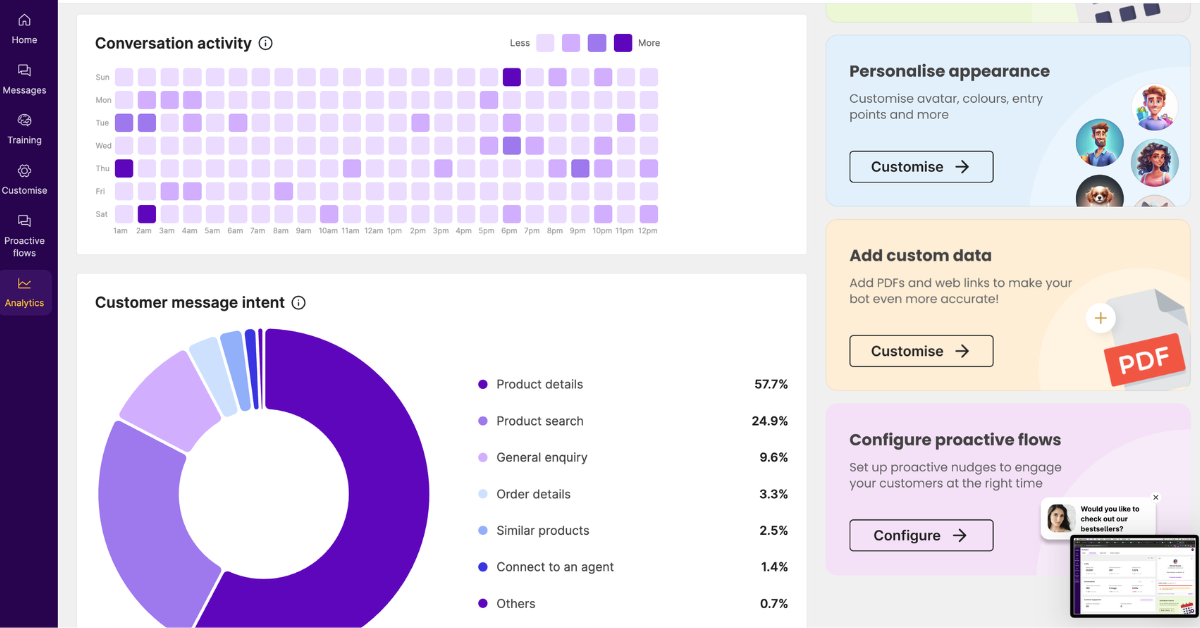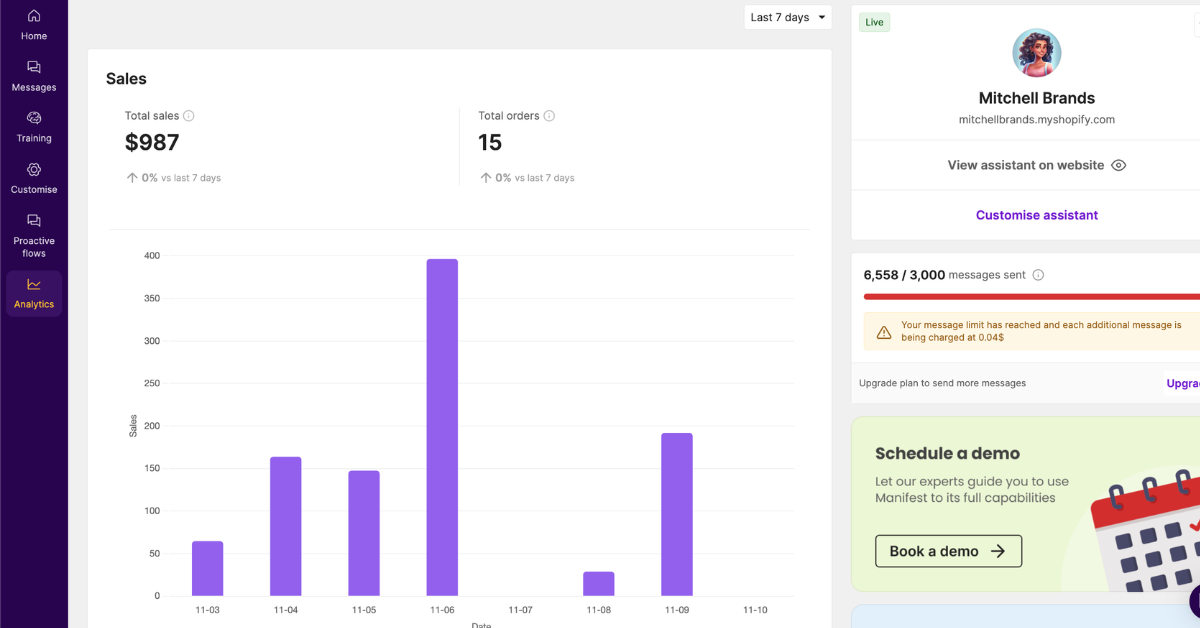7 Best Ecommerce Analytics Tools Recommended by Experts

Are you looking for ways to improve your ecommerce business?
One of the key areas to focus on is analytics. By analyzing data and gaining insights, you can make informed decisions to drive sales and grow your online store. In this blog post, we will introduce you to the 7 best ecommerce analytics tools that are highly recommended by experts in the industry. These tools will not only provide you with valuable data but also help you track your website performance, understand customer behavior, and optimize your marketing strategies. Let's dive in and discover the tools that can take your ecommerce business to the next level.
What are ecommerce analytical tools?

Ecommerce analytics tools are like super-smart helpers for online businesses. Imagine you have a store on the internet, selling stuff. To make your store better, you need to understand what your customers like, how they shop, and what makes them buy things. Ecommerce analytics tools do exactly that. They collect information about how people visit and use your website.
These tools track what products people look at, which ones they buy, and even the ones they add to their cart but don't end up buying. They also tell you how customers found your website – whether through a search engine, social media, or an advertisement.
By analyzing this information, you can figure out what's working well and what's not. For example, if you see that a particular product is being viewed a lot but not many are buying it, you might need to adjust the price or how it’s displayed. In short, these ecommerce analytics tools list help you make smarter decisions to improve your online store and sell more.
7 Best Ecommerce Analytics Tools
Here are the list of 7 best ecommerce analytics tools:
Google Analytics for Ecommerce

Google Analytics is one of the popular & free ecommerce analytics tools that provides detailed data on website traffic, user behavior, and conversions. It specifically offers e-commerce tracking features that analyze product performance, track marketing campaigns, and identify trends in customer behavior.
Pros:
- Free and comprehensive: Provides a wealth of data at no cost, empowering even small businesses.
- User-friendly interface: Offers intuitive dashboards and reports, simplifying data analysis.
- Customizable reporting: Enables tailoring reports to specific needs and business goals.
- E-commerce specific features: Tracks product performance, analyzes customer journeys, and identifies conversion opportunities.
- Integrations: Connects with various e-commerce platforms and marketing tools for holistic data analysis.
Cons:
- Learning curve: May require some time and effort to fully understand its functionalities.
- Data overload: Interpreting vast amounts of data can be challenging for beginners.
- Limited data storage: Free plans offer limited data storage for historical analysis.
Why Choose Google Analytics?
For e-commerce businesses, Google Analytics is an invaluable tool. It provides a data-driven foundation for understanding customer behavior, optimizing marketing campaigns, and driving sales.
Pricing: Google Analytics offers a free plan with basic features and paid plans with additional capabilities and data storage.
Manifest AI

Manifest AI is an advanced AI-powered platform that transforms the way you analyze your ecommerce data. It goes beyond basic metrics, providing deeper insights into customer behavior, product performance, and marketing effectiveness. By leveraging natural language processing and machine learning, Manifest AI is one of the best ecommerce analytics tools helps you understand your customers better, optimize your marketing campaigns, and ultimately drive sales growth.
Pros:
- Unparalleled Insights: Analyze data from multiple sources like conversion rate, product demand, product questions, average order value and more to uncover hidden patterns and gain deeper customer understanding.
- Predictive Analytics: Forecast future trends and anticipate customer needs to make proactive decisions.
- Personalized Recommendations: Deliver relevant product recommendations to individual customers, increasing engagement and conversion rates.
- Automated Optimization: Automatically optimize your marketing campaigns for better performance and ROI.
- User-Friendly Interface: Easy-to-use interface with visual dashboards and reports makes data analysis accessible to everyone.
Cons:
- Limited Integration: Not yet integrated with all popular ecommerce platforms.
- Learning Curve: Initial setup and learning the platform can take some time.
Why Choose Manifest AI?
If you're looking to take your ecommerce analytics to the next level, Manifest AI is the ecommerce analytics software. Its powerful AI capabilities, coupled with insightful recommendations and automation features, can help you gain a significant competitive edge. However, be prepared for the initial learning curve and consider the pricing before making a decision.
Price:
Starts from $39 per month and even you can start with a free trial also.
Adobe Analytics

Adobe Analytics is a comprehensive ecommerce analytical tool that empowers businesses to understand their online customer behavior, optimize marketing campaigns, and drive revenue growth. It provides a holistic view of website traffic, user engagement, conversion rates, and more, allowing you to make data-driven decisions for your online store.
Pros:
- Deep insights: Uncover detailed information about your customers, their purchase journeys, and what resonates with them.
- Seamless integration: Integrates seamlessly with other Adobe Experience Cloud solutions for a unified understanding of your customer lifecycle.
- Powerful reporting: Generate customized reports and dashboards to track ecommerce key performance indicators (KPIs) and identify areas for improvement.
- AI-powered predictions: Leverage AI capabilities to predict future trends and customer behavior, enabling proactive marketing strategies.
- Scalability: Accommodates the needs of growing businesses with flexible pricing plans and robust data handling capabilities.
Cons:
- Steep learning curve: The vast array of features and reports may require some training and familiarization.
- High pricing: Can be expensive for smaller businesses or those with limited budgets.
- Customization complexity: Setting up advanced features and customization may require technical expertise.
Why choose Adobe Analytics?
If you're a large or medium-sized business looking for a comprehensive and powerful ecommerce analytics solution, Adobe Analytics is a top contender. Its depth of insights, AI capabilities, and seamless integration with other Adobe solutions make it ideal for businesses seeking to optimize their online strategies and drive significant growth.
Pricing:
Adobe Analytics offers various pricing plans based on the number of websites, data volume, and desired features. Contact Adobe sales for a customized quote.
Shopify Analytics

Shopify Analytics is a built-in tool within the Shopify platform that provides valuable insights into your online store's performance. It empowers you to analyze sales, customer behavior, marketing campaigns, and more, allowing you to make data-driven decisions for growth.
Pros:
- Comprehensive reporting: Track key metrics like sales, orders, traffic, and customer acquisition costs across various timeframes.
- Detailed insights: Gain in-depth knowledge of customer behavior, including product popularity, abandoned carts, and purchase journeys.
- Customization: Create custom reports and dashboards to focus on specific aspects of your business.
- Integration: Seamlessly integrates with other Shopify tools, like marketing and inventory management, for a holistic view.
- Ease of use: User-friendly interface and intuitive dashboards make data accessible even for beginners.
Cons:
- Limited advanced features: Lacks some advanced functionalities found in dedicated ecommerce analytics platforms.
- Cost: Included in Shopify plans, but may be expensive for smaller businesses.
Pricing:
- Shopify Basic: Included (limited reports)
- Shopify: Included
- Advanced Shopify: Included
- Shopify Plus: Customizable pricing
Why Choose Shopify Analytics:
- Simple and familiar: No need to learn a new platform, data is readily available within your Shopify interface.
- Tailored to ecommerce: Specifically designed to meet the needs of online businesses, offering relevant metrics and insights.
- Cost-effective: Included in most Shopify plans, eliminating the need for additional software.
- Valuable data: Gain actionable insights to optimize your store, improve marketing strategies, and make informed business decisions.
Woopra

Woopra is a powerful e-commerce analytics tool that provides real-time data and user behavior insights to help you optimize your online store. It goes beyond basic analytics, offering features like:
- Detailed visitor tracking: Monitor individual visitor journeys across your website, understanding their actions and identifying potential conversion roadblocks.
- Funnel analysis: Analyze the performance of key conversion funnels, pinpointing drop-off points and optimizing the user experience for improved results.
- Real-time reporting: Get instant insights using ecommerce reporting tools into website traffic, visitor behavior, and sales performance, allowing you to make data-driven decisions on the fly.
- Session replay: Replicate individual user sessions to visualize how visitors interact with your website, uncovering usability issues and optimization opportunities.
Pros
- Comprehensive data: Woopra offers a wealth of data points and reports, providing a holistic view of your website's performance and visitor behavior.
- Actionable insights: The tool goes beyond data analysis for ecommerce , offering actionable insights and recommendations to improve your e-commerce strategy.
- Real-time tracking: Get instant updates on website activity, allowing you to react to trends and make adjustments as needed.
- User-friendly interface: Woopra boasts a user-friendly interface that makes it easy to access and analyze data, even for non-technical users.
Cons
- Learning curve: Woopra's comprehensive features can be overwhelming for beginners, requiring a learning curve to fully utilize its capabilities.
- Pricing: Woopra's pricing plans can be expensive for small businesses, making it less accessible for startups and solo entrepreneurs.
- Limited customization: While Woopra offers various reports and data points, its customization options are limited compared to some competitors.
Why Choose Woopra?
Woopra is an excellent choice for e-commerce businesses that require detailed visitor insights and real-time data to optimize their website and marketing efforts. Its comprehensive features and actionable insights empower businesses to make data-driven decisions and improve their overall performance.
Kissmetrics

Kissmetrics is a powerful e-commerce analytics platform designed to help businesses understand their customers better than ever before. This robust tool takes a deep dive beyond traditional website analytics, analyzing user behavior and identifying growth opportunities throughout the customer journey.
Key Features:
- Detailed Customer Profiles: Kissmetrics builds comprehensive profiles of individual customers, revealing their behavior patterns, preferences, and purchase history. This allows for personalized marketing campaigns and targeted recommendations.
- Funnel Analysis: Identify pain points and optimize your sales funnel by analyzing drop-off points and understanding where customers abandon their carts or checkout process.
- Cohort Analysis: Segment customers based on demographics, purchase behavior, and other factors to understand how different groups interact with your brand. This enables tailored marketing strategies and product development.
- A/B Testing: Test different versions of your website, email campaigns, and product pages to see which ones perform better and improve your conversion rates.
Pros:
- Unparalleled Customer Insights: Kissmetrics goes beyond basic metrics, providing a deeper understanding of user intent and motivations.
- Actionable Data: The platform translates insights into actionable data, guiding strategic decisions and improving marketing effectiveness.
- Flexible Customization: Customize dashboards and reports to focus on specific metrics and KPIs that align with your business goals.
- Scalable Growth: Kissmetrics grows with your business, adapting to accommodate increasing data volume and evolving needs.
Cons:
- Learning Curve: The platform can be complex for beginners, requiring some time and effort to master its features.
- Pricing: Kissmetrics pricing plans can be expensive for small businesses, with a steeper learning curve compared to other options.
Why Choose Kissmetrics:
If you're a growing e-commerce business seeking to unlock deep customer insights and drive sustainable growth, Kissmetrics is a powerful tool worth considering. Its ability to deliver actionable data, personalize marketing campaigns, and optimize the customer journey sets it apart from other analytics platforms.
Pricing: Kissmetrics offers tiered pricing plans based on your monthly active users (MAU). The starting price is $299/month for 1000 MAU.
Mixpanel

Mixpanel empowers e-commerce businesses with a comprehensive analytics platform, offering deep insights into user behavior and website performance. By tracking user activity with ecommerce tracking tools across every touchpoint, from product browsing to purchase completion, Mixpanel paints a detailed picture of your customer journey.
Pros:
- Powerful Analytics: Analyze user behavior across funnels, cohorts, and custom events, gaining actionable insights into customer acquisition, conversion, and retention.
- Predictive Intelligence: Leverage machine learning to predict future customer behavior, personalize experiences, and optimize marketing campaigns.
- Seamless Integrations: Integrate Mixpanel with your existing e-commerce platform, CRM, and other marketing tools for a unified data picture.
- Flexibility & Customization: Tailor dashboards and reports to your specific needs and track key metrics relevant to your business goals.
Cons:
- Learning Curve: Initial setup and configuration require investment in understanding the platform's capabilities.
- Pricing: Can be expensive for smaller businesses, with pricing based on monthly active users and data volume.
- Limited Customer Support: Free plans offer limited support, requiring paid plans for priority assistance.
Why Choose Mixpanel:
Mixpanel goes beyond traditional web analytics, providing deeper insights into how users interact with your store. This data empowers you to make data-driven decisions to:
- Optimize customer acquisition: Identify the most effective marketing channels and campaigns.
- Boost conversion rates: Reduce friction in the checkout process and optimize product pages.
- Increase customer retention: Personalize experiences and engage customers with targeted messaging.
- Drive long-term growth: Identify opportunities to improve your overall e-commerce strategy.
Conclusion
When it comes to running a successful ecommerce business, having access to accurate and actionable data is crucial. That's where ecommerce analytics tools come in. These tools provide valuable insights into customer behavior, sales trends, and marketing effectiveness, allowing you to make informed decisions that can drive your business forward. In this blog, we've highlighted seven of the best ecommerce analytics tools recommended by experts. By leveraging the power of these tools, you can gain a deeper understanding of your customers and optimize your business strategies for maximum success. If you're ready to take your ecommerce analytics to the next level, start a free trial with Manifest AI now and unlock the full potential of your data.

.png)
